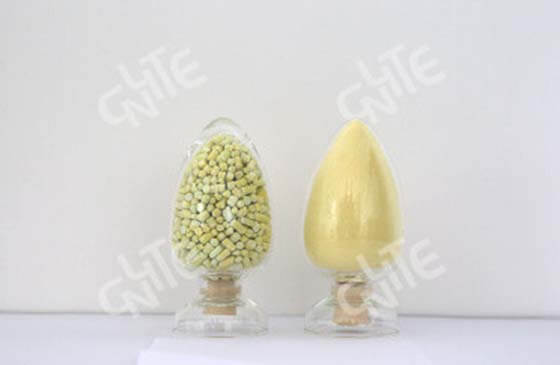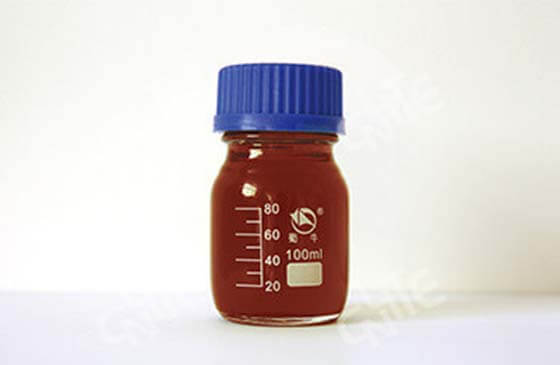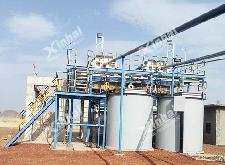

Warm Tip: If you want to know more details about equipment, solutions, etc, please click the button below for free consultation, or leave your requirements!
Barite is a salt mineral, so flotation is commonly used in the process of barite.
The interaction between collectors and barite minerals has a large impact on the grade and recovery rate of barite concentrates. At the same time, when flotation separates the associated minerals with similar floatability to barite, an effective inhibitor can increase the floatability difference between the two, which is also one of the keys to barite flotation separation. Therefore, in the flotation process of barite ore, both inhibitors and collectors play a very important role. Under conventional flotation conditions, the recovery rate of barite can reach more than 80%, and the collector also has good foaming properties, so the activator and foaming agent are rarely involved in barite flotation.
In addition, flotation mainly occurs on the surface of barite minerals. The quality of flotation is related to the floatability of barite, the surface electricity, the strength of chemical adsorption , the pH value of the flotation environment and the number of concentration stages, etc.
The collector is the key to determine whether the barite minerals can be separated effectively.
Barite flotation generally uses anionic collectors, and fatty acids are one of the less selective ones. The common ones are oleic acid, sodium oleate, and oxidized paraffin soap. Flotation depends in many cases on the concentration of fatty acid anions in the pulp, and the concentration of fatty acid anions is related to the pH of the pulp.
Oxidized paraffin soap is processed from paraffin, with abundant raw materials and low price. Its beneficiation effect varies with the properties of the product. The foaming property is weaker than that of oleic acid, and it has better biodegradability. In addition, if the acid value of the product is higher, the flotation index will be better. Some studies have found that oxidized paraffin soap has better adaptability to medium conditions (pH value and its modifier category) than sodium oleate.
Fatty acid collectors have strong collecting ability , non-toxicity and low dosage, but they are not resistant to low temperature, have poor selectivity and high price.
Alkyl sulfate collectors have strong collecting ability , certain foaming performance, and at the same time, they have the characteristics of low toxicity, easy water solubility and good selectivity. So they’re commonly used in barite flotation.
Sodium dodecyl sulfate (RO-SO 3 Na) and sodium dodecyl sulfonate (R-SO 3 Na) are common alkyl sulfate collectors in industrial production. Used in the form of combined collectors.
The amphoteric collector contains both anionic functional groups and cationic functional groups, which are not affected by hard water and seawater in most cases, and have good water solubility and low temperature resistance. The ion undergoes chelation, which shows excellent selectivity and is also suitable for barite beneficiation .

Barite and fluorite have similar mineralization rules, and are often embedded with each other. The density difference between the two is small, and the gravity separation method is difficult to separate them. Moreover, they both belong to salt minerals, with similar flotability, and flotation separation is also difficult. Therefore, the barite inhibitor is mainly used in the flotation of barite-fluorite type ore to inhabit barite. Barite inhibitors mainly include polymeric carbohydrates such as tannin extract, starch, dextrin and sodium lignosulfonate, and inorganic salt compounds composed of sodium silicate, sodium carbonate, sodium hexametaphosphate, Al 3+ and Pb 2+ and the combination inhibitor formed by mixing them.
When quartz is the main gangue mineral in barite ore, and water glass is generally used as the inhibitor. On the one hand, barite minerals have better floatability under weak alkaline conditions, and the weak alkaline flotation environment is also beneficial for water glass to inhibit quartz and other gangue minerals.
In barite flotation, the addition of metal cations can expand the pH range of mineral flotation and play an activating or inhibiting role. Aluminum sulfate is an effective inhibitor of barite. When the pH of the slurry is 4.5~7.5, aluminum sulfate has a strong inhibitory effect on barite, while fluorite can still maintain good floatability. Sulfate inhibition of barite can also rely on SO 4 2- generated by hydrolysis and ionization to react with Ba 2+ on the surface of barite, so that the barite is inhibited.
In order to improve the inhibitory effect of the agent, combined inhibitors are often used in flotation. With the development of mineral resources, barite ore has complex co-association relationship, fine embedded particle size and similar floatability. The use of inhibitors has become one of the keys to flotation of barite. Among them, combined inhibitors can greatly improve the effect and become a development trend with practical significance to improve the inhibitory effect, improve the inhibitory efficiency and reduce the consumption of pharmaceuticals.

The pH value is an important factor affecting the flotation of barite, and the floatability of minerals varies with the pH value of the pulp. In the flotation process of barite, there is a range of maximum floatability pH value, and its maximum floatability pH range is about neutral pH, which increases with the increase of oleic acid dosage within a certain range.
In actual production, there are certain requirements for the concentration times. Under the given test conditions, the concentrate after one flotation stage still contains some gangue, in order to remove these gangue and impurities, it needs to be concentrated several times. The smaller the potency of the collector and the adjusting reagent is, the more useful ore particles will be removed as middling, and the recovery rate will decrease, so the number of concentration should be reasonably controlled.
To wrap up, the flotation of barite is affected by various factors such as collectors, inhibitors, pH value of pulp and concentration times. In actual operation, we should do continuous tests to obtain high-quality concentrate quality and find the most reasonable test conditions.
If you have any questions about the content of the article, or want to consult the beneficiation of barite, please consult the online customer service or leave a message for more information.
1How To Do Flotation Test?
 0
0
 5173
5173
2Ultimate Guide of Gold Flotation Process
 3
3
 6792
6792
3How to Choose the Froth Flotation Process According to the Flotation Stage?
 0
0
 3887
3887


What Are the Differences Between CIP and CIL?
 11961
11961
 0
0